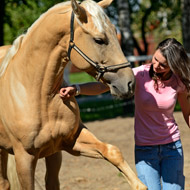Horse Trust joins Animal Behaviour and Training Council

The Horse Trust will help to promote the use of safe, effective and humane methods of training and behaviour modification.
The world’s oldest equine charity has become the first equine-focussed Advisory Member of the Animal Behaviour and Training Council (ABTC).
The Horse Trust provides respite and retirement to working horses across the UK that have experienced cruelty and neglect. It also provides training for professionals working on the frontline of horse welfare, such as the police and local authority inspectors.
As a member of the ABTC, the Horse Trust will help to promote the use of safe, effective and humane methods of training and behaviour modification for horses. Currently, anyone can call themselves a behaviourist, making it difficult for owners and riders to get the right knowledge and advice.
Commenting on the move, Liane Preshaw, director of knowledge and skills at The Horse Trust, said she would like to see more trainers and behaviourists meeting the ABTC’s standards and becoming accredited.
“This will ensure the trainer/behaviourist understands the importance of ruling out pain or discomfort as a cause of unwanted behaviours, the need to ensure the horse’s needs are met and the impact on the horse’s behaviour if they aren’t, and how to train horses optimally by understanding how they learn,” she said.
“We would like to encourage more equine professionals to develop their knowledge and skills so that they can help safeguard the psychological health of our horses.”
The ABTC is the regulatory body that represents animal trainers and animal behaviour therapists to the legislative and public bodies. It sets and maintains standards of practical skills and knowledge needed to be a behaviourist, training instructor or animal therapist. It also maintains the national register of appropriately-qualified individuals.
David Montgomery, president of the ABTC, said “Our understanding of welfare issues associated with all animal training and behaviour interventions has grown enormously over the years and with it the need to establish and promote standards that reflect best practice.
“The ABTC has made significant progress towards this goal with smaller companion animals and is therefore delighted to broaden its scope into the equine world with the support of the Horse Trust.”



 RCVS Knowledge has welcomed Professor Peter Cockcroft as editor-in-chief for Veterinary Evidence.
RCVS Knowledge has welcomed Professor Peter Cockcroft as editor-in-chief for Veterinary Evidence.